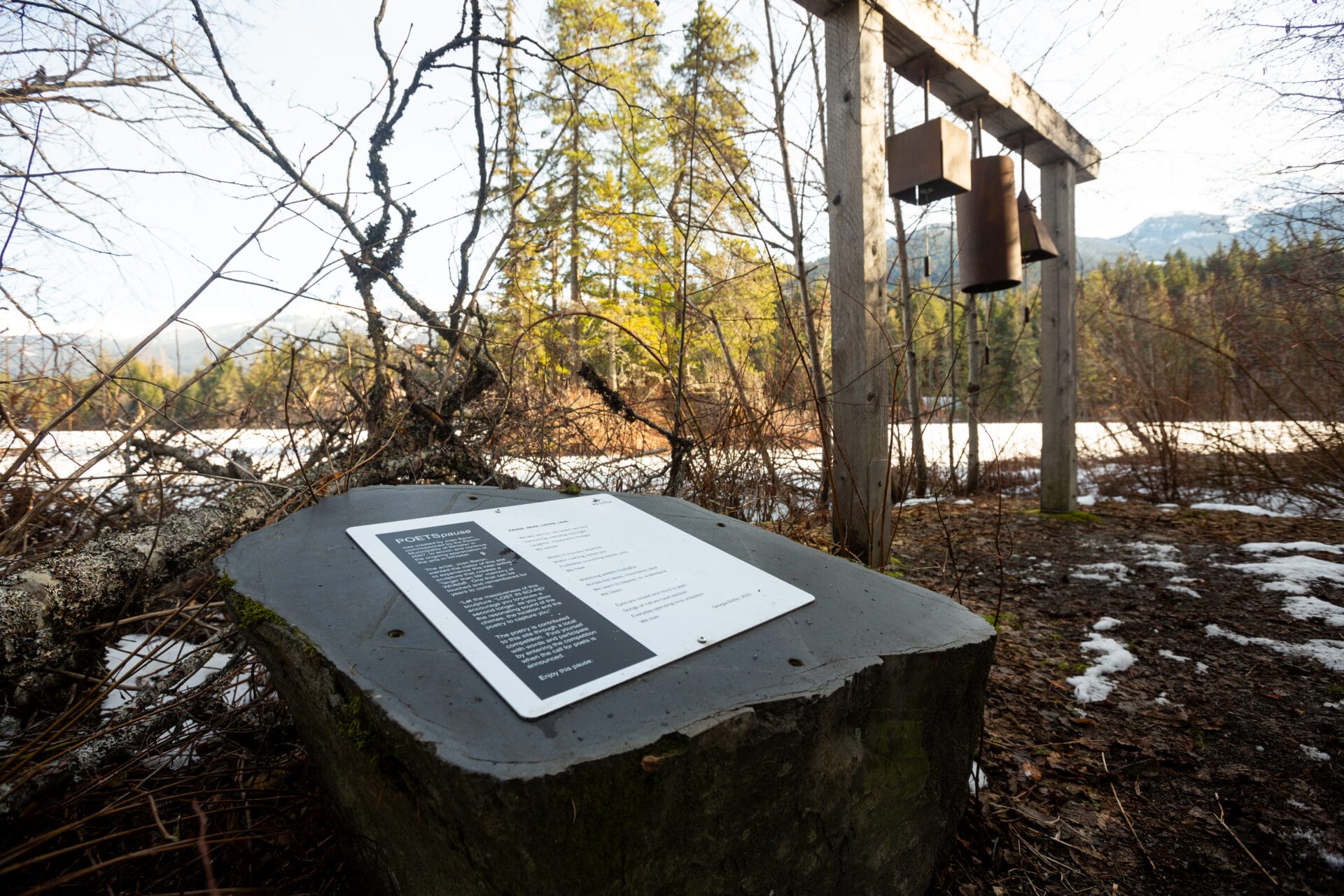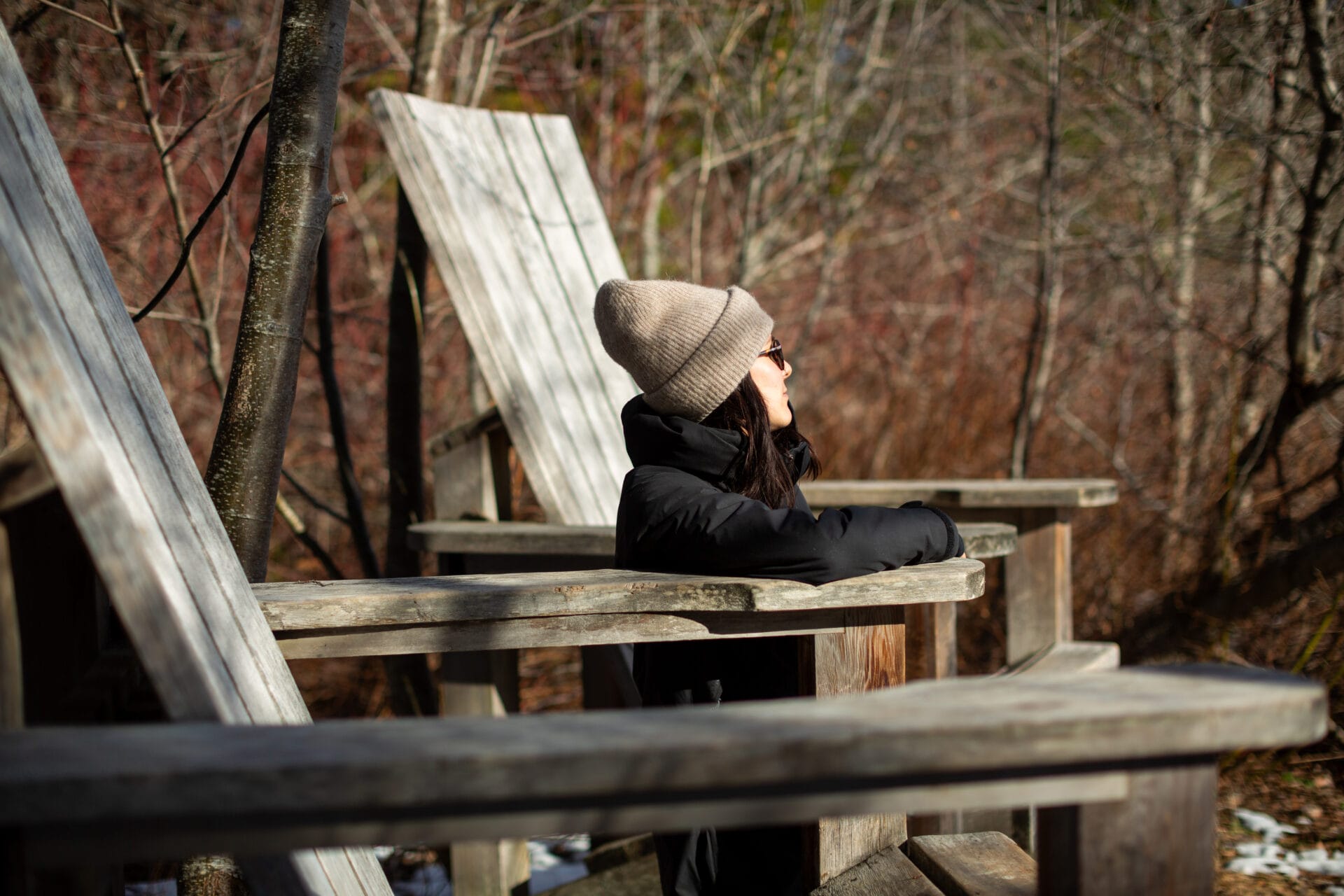Since 2009, the Resort Municipality of Whistler has been inviting writers to translate inspiration into an original work of art for the Poet’s Pause poetry competition.
With its towering peaks, tranquil forests and flowing rivers, it’s easy to find that special sense of awe in Whistler.
Every year, dozens of people from around the world submit their pieces for a chance to have their work displayed at the Poet’s Pause sculpture sites in Alta Lake Park. One will be displayed at the large metal chimes titled “Lost in Sound” located in the north part of the park, and the other at the giant Adirondack chairs titled “Lakeside Couple” in the south end of the park.
 Lost in Sound
Lost in Sound Lakeside Couple
Lakeside Couple
Photo: Oisin McHugh
Poems must touch on the themes related to these sculptures: “Listening” or “Togetherness.”
Poet’s Pause is part of a public art concept created by the late Joan Baron, an artist who developed the two Alta Lake Park sculpture sites to foster creativity. She wanted the visitors to experience the interactive sculptures as a “larger than life” memory of Whistler, which can betouched and remembered for years to come.
This year, the competition saw more than 50 submissions from 35 poets.
Winners receive a prize of $250 and have their work read at a Council Meeting in April as part of National Poetry Month.
Congratulations to this year’s Poet’s Pause winners Nancy Issenman and David Footle!
Read each their winning submissions, as well as their answers to a few interview questions below:
Nancy Issenman, winner of the 2024 Poet’s Pause competition Listening category
believe me when I say
I would be translator-
Ear to the hum & gurgle
of the rolling river
eye to the shimmering
droplets, all tiny suns
a whiff of river lily
sweet and lemony
tongue quickening
to the coolness
there is a hymn
in the whirl of water
but no words
for what the river
says
Bio
Nancy Issenman is a writer and artist living on unceded Lekwungen territory, home to the Songhees Nation and Esquimalt Nation, in what is also referred to as Victoria, B.C. She has retirement to thank for reigniting her love of reading and writing. Nancy has published a chapbook, The Name of Yes, and her poems have appeared in various publications, including the anthology The Sky is Falling, The Sky is Falling (Goldfinch Press), Lilac Arch Press, Sea and Cedar Magazine and Island Writers Magazine. One of her stories was published in don’t tell: family secrets (Demeter Press).
I visited Whistler many years ago to visit a friend who had a wellness products line used in resorts and hotels in the area. I will be back again soon.
Where do you find your inspiration for writing?
I get inspired by reading other poets. When I resonate with a poem, I use the form or sentiment of the poem and respond to it in my own way. Sometimes a particular line will jump into my lap and ask to be used as an epigraph or title or within the body of my own poem.
I attend workshops regularly, where prompts are suggested. These can send me on a literary journey, somewhere I wouldn’t have gone if I were alone at my computer. There are lots of inspiring craft books out there.
I am fortunate to be part of a few writing groups and Victoria’s weekly reading series, Planet Earth Poetry,which all keep the juices flowing.
As an activist, I am often moved to respond in my poems to social and political events. No dearth of material there.
Listening in on snippets of people’s conversation can generate a poem.
I strive to be present with and curious about my environment, outside and in. Meditation is a regular practice of mine. Thoughts often percolate around a poem while I’m sitting, and I must wait until the time is up to write them down. Sometimes I cheat though.
Why do you think the blending of outdoors with artistic expression is important/special?
My happy place is walking in the forest with my dogs. The trees help me align with my quieter, calmer self. From there I can access ideas and concepts that translate not just into creative expression like art and poetry, but also into how I see and act in the world. With so much destruction of our beautiful nature, being outdoors is a necessary bridge between grief and gratitude.
What is a new word you recently learned?
Phosphenes: images of light or colour one can see while the eyes are closed–luminous floating stars, zigzags, swirls, spirals, squiggles and other shapes.
David Footle, winner of the 2024 Poet’s Pause competition Togetherness category
Matrilineal
Be a Child of nature.
Feel nurtured.
Held and comforted.
Pressed against bosomed earth peaks.
Feel cared and provided for.
Assured the bounty
there is for you.
But be a Child of nature.
Raised.
Among reeds, birdsong.
Formed by tall grass, tree shade.
Have years etched by streams.
Lessons learned in stone skips, morning dew.
But be a Child of nature.
Feel protective.
Determined your upbringer receives
all due respect.
Revere the eldest.
Strive to keep. Dear
in heart for as long as able.
But be a Child of nature.
Of nature, a Child.
Be filled with awe, wonder.
Be filled with curiosity, contemplativeness.
Be invigorated to run from one flower to another as if each is
the next greatest thing.
Be a Child of nature.
Of nature, a Child.
Be open to whimsey, magic.
Be open to grounding, balance.
Be called to hear each different croak and bark of the closest frog as if each is
a message just for you.
Be a Child of nature.
Of nature, a Child.
Be mindful of silliness, joy.
Be mindful of connection, empathy.
Be excited to spread your arms wide like the birds overhead soaring as if each is
showing you how to fly.
Be a Child of nature.
Act like one.
Ask questions like one.
Talk like one.
You have permission. Though,
you didn’t need it. You have it.
Nature gave it to you
the first time you called
Her Mother.
Bio
David Footle is a trained arachnologist with a degree in biology, focusing on arachnology. He currently lives and works as an interpreter of the natural world in Denver, Colorado. His cousin, Keely, has served as a Ski Patrol and Mountain Safety volunteer for many years, and David was truly inspired by Whistler, after being invited up by her in both the ski and mud seasons. Trips outdoors with David are punctuated by frequent pauses to splendor at any tiny, living thing that crosses his path. While exploring the biological side of hard sciences, David still maintains a large penchant for poetry, indulged through reading and writing. His current favorites poets are Monica Prince, Jared K. Anderson, Elvira Basevich, and Natalie Sharp; though never too far away from some classic favorites like Poe, Byron, and Sandburg.
David’s love of poetry started early. Cultivated by his Great Aunt Flora who set out to ensure he was cultured through exposure to all kinds of art forms. After taking poetry and storytelling courses in college and grad-school, he continued to write poetry. He most recently had his work published as part of The Closed Eye Open’s Maya’s Micros; a special butterfly themed collection printed by Poet’s Choice; and Issue 45 of the Beyond Words Literary Magazine.
Where do you find your inspiration for writing?
I find my inspiration for a lot of my poetry from the little things. I’m fascinated by the nuances of nature as much as the big, event-type natural occurrences. Watching the foraging trails of ants, listening to a bird call over and over to pinpoint exactly which branch it’s sitting on, the feel of grass between your toes. My inspiration also comes from watching how people interact with the world around them, be it in man-made or natural settings.
Why do you think the blending of the outdoors with artistic expression is important/special?
I feel that art and outdoor natural spaces are intrinsically tied. Art imitating nature, and nature bringing art to life in literal and figurative ways. My job as an environmental educator focuses on ways to connect people to the natural world to encourage their stewardship of it. A tried-and-true method to do this is through art and artistic expression in the medium most relevant to each individual.
What’s a new word you recently learned?
Dulosis: the practice by slave-making ants of capturing the pupae of other ant species and rearing them as workers of their own colony.
To learn more about Poet’s Pause and to read the winning poems from past years, visit whistler.ca/PoetryCompetition.



